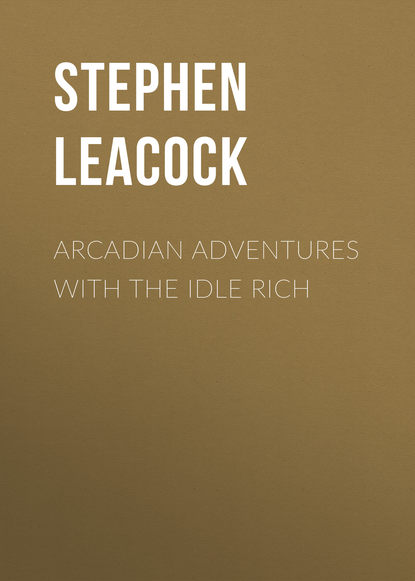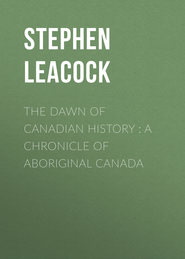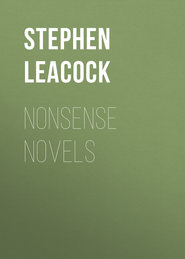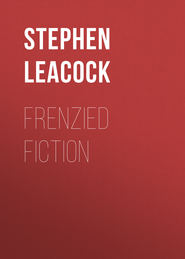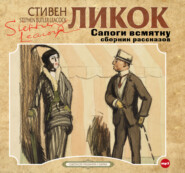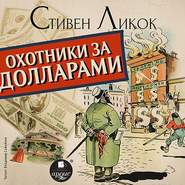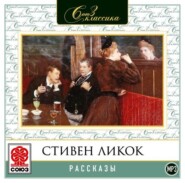По всем вопросам обращайтесь на: info@litportal.ru
(©) 2003-2025.
✖
Arcadian Adventures with the Idle Rich
Автор
Год написания книги
2019
Настройки чтения
Размер шрифта
Высота строк
Поля
What Mr. Fyshe really meant was, "I am extremely glad not to have to ask your father, whom I would not introduce to the Duke on any account."
Indeed, Mr. Furlong, senior, the father of the rector of St. Asaph's, who was President of the New Amalgamated Hymnal Corporation, and Director of the Hosanna Pipe and Steam Organ, Limited, was entirely the wrong man for Mr. Fyshe's present purpose. In fact, he was reputed to be as smart a man as ever sold a Bible. At this moment he was out of town, busied in New York with the preparation of the plates of his new Hindu Testament (copyright); but had he learned that a duke with several millions to invest was about to visit the city, he would not have left it for the whole of Hindustan.
"I suppose you are asking Mr. Boulder," said the rector.
"No," answered Mr. Fyshe very decidedly, dismissing the name absolutely.
Indeed, there was even better reason not to introduce Mr. Boulder to the Duke. Mr. Fyshe had made that sort of mistake once, and never intended to make it again. It was only a year ago, on the occasion of the visit of young Viscount FitzThistle to the Mausoleum Club, that Mr. Fyshe had introduced Mr. Boulder to the Viscount and had suffered grievously thereby. For Mr. Boulder had no sooner met the Viscount than he invited him up to his hunting-lodge in Wisconsin, and that was the last thing known of the investment of the FitzThistle fortune.
This Mr. Boulder of whom Mr. Fyshe spoke might indeed have been seen at that moment at a further table of the lunch room eating a solitary meal, an oldish man with a great frame suggesting broken strength, with a white beard and with falling under-eyelids that made him look as if he were just about to cry. His eyes were blue and far away, and his still, mournful face and his great bent shoulders seemed to suggest all the power and mystery of high finance.
Gloom indeed hung over him. For, when one heard him talk of listed stocks and cumulative dividends, there was as deep a tone in his quiet voice as if he spoke of eternal punishment and the wages of sin.
Under his great hands a chattering viscount, or a sturdy duke, or a popinjay Italian marquis was as nothing.
Mr. Boulder's methods with titled visitors investing money in America were deep. He never spoke to them of money, not a word. He merely talked of the great American forest—he had been born sixty-five years back, in a lumber state—and, when he spoke of primeval trees and the howl of the wolf at night among the pines, there was the stamp of reality about it that held the visitor spellbound; and when he fell to talking of his hunting-lodge far away in the Wisconsin timber, duke, earl, or baron that had ever handled a double-barrelled express rifle listened and was lost.
"I have a little place," Mr. Boulder would say in his deep tones that seemed almost like a sob, "a sort of shooting box, I think you'd call it, up in Wisconsin; just a plain place"—he would add, almost crying—"made of logs."
"Oh, really," the visitor would interject, "made of logs. By Jove, how interesting!"
All titled people are fascinated at once with logs, and Mr. Boulder knew it—at least subconsciously.
"Yes, logs," he would continue, still in deep sorrow; "just the plain cedar, not squared, you know, the old original timber; I had them cut right out of the forest."
By this time the visitor's excitement was obvious. "And is there game there?" he would ask.
"We have the timber-wolf," said Mr. Boulder, his voice half choking at the sadness of the thing, "and of course the jack wolf and the lynx."
"And are they ferocious?"
"Oh, extremely so—quite uncontrollable."
On which the titled visitor was all excitement to start for Wisconsin at once, even before Mr. Boulder's invitation was put in words.
And when he returned a week later, all tanned and wearing bush-whackers' boots, and covered with wolf bites, his whole available fortune was so completely invested in Mr. Boulder's securities that you couldn't have shaken twenty-five cents out of him upside down.
Yet the whole thing had been done merely incidentally round a big fire under the Wisconsin timber, with a dead wolf or two lying in the snow.
So no wonder that Mr. Fyshe did not propose to invite Mr. Boulder to his little dinner. No, indeed. In fact, his one aim was to keep Mr. Boulder and his log house hidden from the Duke.
And equally no wonder that as soon as Mr. Boulder read of the Duke's arrival in New York, and saw by the Commercial Echo and Financial Undertone that he might come to the City looking for investments, he telephoned at once to his little place in Wisconsin—which had, of course, a primeval telephone wire running to it—and told his steward to have the place well aired and good fires lighted; and he especially enjoined him to see if any of the shanty men thereabouts could catch a wolf or two, as he might need them.
"Is no one else coming then?" asked the rector.
"Oh yes. President Boomer of the University. We shall be a party of four. I thought the Duke might be interested in meeting Boomer. He may care to hear something of the archaeological remains of the continent."
If the Duke did so care, he certainly had a splendid chance in meeting the gigantic Dr. Boomer, the president of Plutoria University.
If he wanted to know anything of the exact distinction between the Mexican Pueblo and the Navajo tribal house, he had his opportunity right now. If he was eager to hear a short talk—say half an hour—on the relative antiquity of the Neanderthal skull and the gravel deposits of the Missouri, his chance had come. He could learn as much about the stone age and the bronze age, in America, from President Boomer, as he could about the gold age and the age of paper securities from Mr. Fyshe and Mr. Boulder.
So what better man to meet a duke than an archaeological president?
And if the Duke should feel inclined, as a result of his American visit (for Dr. Boomer, who knew everything, understood what the Duke had come for), inclined, let us say, to endow a chair in Primitive Anthropology, or do any useful little thing of the sort, that was only fair business all round; or if he even was willing to give a moderate sum towards the general fund of Plutoria University—enough, let us say, to enable the president to dismiss an old professor and hire a new one—that surely was reasonable enough.
The president, therefore, had said yes to Mr. Fyshe's invitation with alacrity, and had taken a look through the list of his more incompetent professors to refresh his memory.
The Duke of Dulham had landed in New York five days before and had looked round eagerly for a field of turnips, but hadn't seen any. He had been driven up Fifth Avenue and had kept his eyes open for potatoes, but there were none. Nor had he seen any shorthorns in Central Park, nor any Southdowns on Broadway. For the Duke, of course, like all dukes, was agricultural from his Norfolk jacket to his hobnailed boots.
At his restaurant he had cut a potato in two and sent half of it to the head waiter to know if it was Bermudian. It had all the look of an early Bermudian, but the Duke feared from the shading of it that it might be only a late Trinidad. And the head waiter sent it to the chef, mistaking it for a complaint, and the chef sent it back to the Duke with a message that it was not a Bermudian but a Prince Edward Island. And the Duke sent his compliments to the chef, and the chef sent his compliments to the Duke. And the Duke was so pleased at learning this that he had a similar potato wrapped up for him to take away, and tipped the head waiter twenty-five cents, feeling that in an extravagant country the only thing to do is to go the people one better. So the Duke carried the potato round for five days in New York and showed it to everybody. But beyond this he got no sign of agriculture out of the place at all. No one who entertained him seemed to know what the beef that they gave him had been fed on; no one, even in what seemed the best society, could talk rationally about preparing a hog for the breakfast table. People seemed to eat cauliflower without distinguishing the Denmark variety from the Oldenburg, and few, if any, knew Silesian bacon even when they tasted it. And when they took the Duke out twenty-five miles into what was called the country, there were still no turnips, but only real estate, and railway embankments, and advertising signs; so that altogether the obvious and visible decline of American agriculture in what should have been its leading centre saddened the Duke's heart. Thus the Duke passed four gloomy days. Agriculture vexed him, and still more, of course, the money concerns which had brought him to America.
Money is a troublesome thing. But it has got to be thought about even by those who were not brought up to it. If, on account of money matters, one has been driven to come over to America in the hope of borrowing money, the awkwardness of how to go about it naturally makes one gloomy and preoccupied. Had there been broad fields of turnips to walk in and Holstein cattle to punch in the ribs, one might have managed to borrow it in the course of gentlemanly intercourse, as from one cattle-man to another. But in New York, amid piles of masonry and roaring street-traffic and glittering lunches and palatial residences one simply couldn't do it.
Herein lay the truth about the Duke of Dulham's visit and the error of Mr. Lucullus Fyshe. Mr. Fyshe was thinking that the Duke had come to lend money. In reality he had come to borrow it. In fact, the Duke was reckoning that by putting a second mortgage on Dulham Towers for twenty thousand sterling, and by selling his Scotch shooting and leasing his Irish grazing and sub-letting his Welsh coal rent he could raise altogether a hundred thousand pounds. This for a duke, is an enormous sum. If he once had it he would be able to pay off the first mortgage on Dulham Towers, buy in the rights of the present tenant of the Scotch shooting and the claim of the present mortgagee of the Irish grazing, and in fact be just where he started. This is ducal finance, which moves always in a circle.
In other words the Duke was really a poor man—not poor in the American sense, where poverty comes as a sudden blighting stringency, taking the form of an inability to get hold of a quarter of a million dollars, no matter how badly one needs it, and where it passes like a storm-cloud and is gone, but poor in that permanent and distressing sense known only to the British aristocracy. The Duke's case, of course, was notorious, and Mr. Fyshe ought to have known of it. The Duke was so poor that the Duchess was compelled to spend three or four months every year at a fashionable hotel on the Riviera simply to save money, and his eldest son, the young Marquis of Beldoodle, had to put in most of his time shooting big game in Uganda, with only twenty or twenty-five beaters, and with so few carriers and couriers and such a dearth of elephant men and hyena boys that the thing was a perfect scandal. The Duke indeed was so poor that a younger son, simply to add his efforts to those of the rest, was compelled to pass his days in mountain climbing in the Himalayas, and the Duke's daughter was obliged to pay long visits to minor German princesses, putting up with all sorts of hardship. And while the ducal family wandered about in this way—climbing mountains, and shooting hyenas, and saving money, the Duke's place or seat, Dulham Towers, was practically shut up, with no one in it but servants and housekeepers and gamekeepers and tourists; and the picture galleries, except for artists and visitors and villagers, were closed; and the town house, except for the presence of servants and tradesmen and secretaries, was absolutely shut. But the Duke knew that rigid parsimony of this sort, if kept up for a generation or two, will work wonders, and this sustained him; and the Duchess knew it, and it sustained her; in fact, all the ducal family, knowing that it was only a matter of a generation or two, took their misfortune very cheerfully.
The only thing that bothered the Duke was borrowing money. This was necessary from time to time when loans or mortgages fell in, but he hated it. It was beneath him. His ancestors had often taken money, but had never borrowed it, and the Duke chafed under the necessity. There was something about the process that went against the grain. To sit down in pleasant converse with a man, perhaps almost a gentleman, and then lead up to the subject and take his money from him, seemed to the Duke's mind essentially low. He could have understood knocking a man over the head with a fire shovel and taking his money, but not borrowing it.
So the Duke had come to America, where borrowing is notoriously easy. Any member of the Mausoleum Club, for instance, would borrow fifty cents to buy a cigar, or fifty thousand dollars to buy a house, or five millions to buy a railroad with complete indifference, and pay it back, too, if he could, and think nothing of it. In fact, ever so many of the Duke's friends were known to have borrowed money in America with magical ease, pledging for it their seats or their pictures, or one of their daughters—anything.
So the Duke knew it must be easy. And yet, incredible as it may seem, he had spent four days in New York, entertained everywhere, and made much of, and hadn't borrowed a cent. He had been asked to lunch in a Riverside palace, and, fool that he was, had come away without so much as a dollar to show for it. He had been asked to a country house on the Hudson, and, like an idiot—he admitted it himself—hadn't asked his host for as much as his train fare. He had been driven twice round Central Park in a motor and had been taken tamely back to his hotel not a dollar the richer. The thing was childish, and he knew it. But to save his life the Duke didn't know how to begin. None of the things that he was able to talk about seemed to have the remotest connection with the subject of money. The Duke was able to converse reasonably well over such topics as the approaching downfall of England (they had talked of it at Dulham Towers for sixty years), or over the duty of England towards China, or the duty of England to Persia, or its duty to aid the Young Turk Movement, and its duty to check the Old Servia agitation. The Duke became so interested in these topics and in explaining that while he had never been a Little Englander he had always been a Big Turk, and that he stood for a Small Bulgaria and a Restricted Austria, that he got further and further away from the topic of money, which was what he really wanted to come to; and the Duke rose from his conversations with a look of such obvious distress on his face that everybody realized that his anxiety about England was killing him.
And then suddenly light had come. It was on his fourth day in New York that he unexpectedly ran into the Viscount Belstairs (they had been together as young men in Nigeria, and as middle-aged men in St. Petersburg), and Belstairs, who was in abundant spirits and who was returning to England on the Gloritania at noon the next day, explained to the Duke that he had just borrowed fifty thousand pounds, on security that wouldn't be worth a halfpenny in England.
And the Duke said with a sigh, "How the deuce do you do it. Belstairs?"
"Do what?"
"Borrow it," said the Duke. "How do you manage to get people to talk about it? Here I am wanting to borrow a hundred thousand, and I'm hanged if I can even find an opening."
At which the Viscount had said, "Pooh, pooh! you don't need any opening. Just borrow it straight out—ask for it across a dinner table, just as you'd ask for a match; they think nothing of it here."
"Across the dinner table?" repeated the Duke, who was a literal man.
"Certainly," said the Viscount. "Not too soon, you know—say after a second glass of wine. I assure you it's absolutely nothing."
And it was just at that moment that a telegram was handed to the Duke from Mr. Lucullus Fyshe, praying him, as he was reported to be visiting the next day the City where the Mausoleum Club stands, to make acquaintance with him by dining at that institution.
And the Duke, being as I say a literal man, decided that just as soon as Mr. Fyshe should give him a second glass of wine, that second glass should cost Mr. Fyshe a hundred thousand pounds sterling.
And oddly enough, at about the same moment, Mr. Fyshe was calculating that provided he could make the Duke drink a second glass of the Mausoleum champagne, that glass would cost the Duke about five million dollars.
So the very morning after that the Duke had arrived on the New York express in the City; and being an ordinary, democratic, commercial sort of place, absorbed in its own affairs, it made no fuss over him whatever. The morning edition of the Plutopian Citizen simply said, "We understand that the Duke of Dulham arrives at the Grand Palaver this morning," after which it traced the Duke's pedigree back to Jock of Ealing in the twelfth century and let the matter go at that; and the noon edition of the People's Advocate merely wrote, "We learn that Duke Dulham is in town. He is a relation of Jack Ealing." But the Commercial Echo and Financial Undertone, appearing at four o'clock, printed in its stock-market columns the announcement: "We understand that the Duke of Dulham, who arrives in town today, is proposing to invest a large sum of money in American Industrials."
And, of course, that announcement reached every member of the Mausoleum Club within twenty minutes.
The Duke of Dulham entered the Mausoleum Club that evening at exactly seven of the clock. He was a short, thick man with a shaven face, red as a brick, and grizzled hair, and from the look of him he could have got a job at sight in any lumber camp in Wisconsin. He wore a dinner jacket, just like an ordinary person, but even without his Norfolk coat and his hobnailed boots there was something in the way in which he walked up the long main hall of the Mausoleum Club that every imported waiter in the place recognized in an instant.





